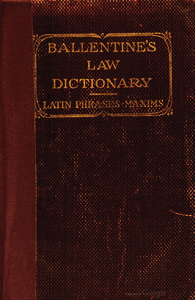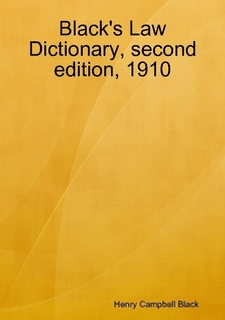Held to include the result of human actionable fault or negligence and not synonymous with “purely accidental” or “mere accident.” See 59 Am. St. Rep. 644, 56 L. R. A. 246.
Definition of Accident
-
Ballentine's Law Dictionary
-
Black's Law Dictionary: 2nd Edition
An unforeseen event, occurring without the will or design of the person whose mere act causes it; an unexpected, unusual or undesigned occurrence; the effect of an unknown cause, or, the cause being known, an unprecedented consequence of it; a casualty. Burkhard v. Travelers' Ins. Co., 102 Pa. 262, 48 Am. Rep. 205; Ætna In Ins. Co. v. Vandecar, 86 Fed. 282, 30 C. C. A. 48; Carnes v. Iowa Traveling Men's Ass'n, 106 Iowa, 281, 76 N. W. 683, 68 Am. St. Rep. 306; Atlanta Acc. Ass in v. Alexander, 104 Ga. 709, 30 S. E. 939. 42 L. R. A. 188; Crutchfield v. Richmond & D. R. Co., 76 N. C. 320; Dozier v. Fidelity & Casualty Co. (O. C.) 46. Fed. 446, 13 In R. A. il4; Fidelity & Casualty Co. v. Johnson, 72 Miss. 333, 17 South. 2, 30 L. R. A. 206. In its proper use the term excludes negligence; that is, an accident is an event which occurs without the fault, carelessness, or want of proper circumspection of the person affected, or which could not have been avoided by the use of that kind and degree of care necessary to the exigency and in the circumstances in which he was placed. Brown v. Kendall, 6 Cush. (Mass.) 292; United States v. Boyd (C. C.) 45 Fed. 851; Armijo v. Abeytia, 5 N. M. 533, 25 Pan. 777; St Louis, etc., R. Co. v. Barnett, 65 Ark. 255, 45 S. W. 550; Aurora Branch Eh Co., v. Grimes, 13 111. 585. But see Schneider v. Provident L. Ins. Co., 24 Wis. 28, 1 Am. Rep. 157. In equity practice. Such an unforeseen event, misfortune, loss, act, or omission as is not the result of any negligence or misconduct in the party. Fran. Max. 87; Story, Eq. Jut. § 78. The meaning to be attached to the word "accident," in relation to equitable relief, is any unforeseen and undesigned event, productive of disadvantage. Wharton. An accident relievable in equity is such an occurrence, not the result of negligence or misconduct of the party seeking relief in relation to a contract, as was not anticipated by the parties when the same was entered into, and which gives an undue advantage to one of them over another in a court of law. Code Ga. 1882, § 3112. And see Bostwiek v. Stiles, 35 Conn. 195; Kopper v. Dyer, 59 Vt 477, 9 Atl. 4, 59 Am. Rep. 742; Magann v. Segal, 92 Fed. 252, 34 C. C. A. 323; Bucki, eta, Lumber Co. v. Atlantic Lumber Co.., 116 Fed. 1, 53 C. C. A. 513; Zimmerer v. Fremont Nat. Bank, 59 Neb. 661, 81 N. W. 849; Pickering v. Cassidy, 93 Me. 139, 44 Atl. 683. In maritime law and marine insurance. "Accidents of navigation" or "accidents of the sea" are such as are peculiar to the sea or to usual navigation or the action of the elements, which do not happen by the intervention of man, and are not to be avoided by the exercise of proper prudence, foresight, and skill. The Miletus, 17 Fed. Cas. 288; The G. R. Booth, 171 In S. 450, 19 Sup. Ct 9, 43 L. Ed. 234; The Cariotta, 5 Fed. Cas. 76; Bazin v. Steamship Co., 2 Fed. Cas. 1,097. See also Perils of the Sea.

